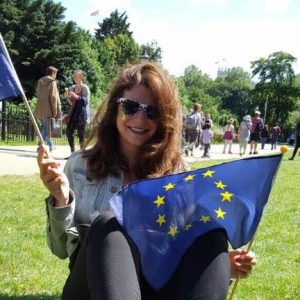They say it’s the little things. All the little decisions you make, each day, like pins marking the trajectory of your life: landmarks that you look back on one day and think, that day changed my life. The coincidences, the people you meet, and the places you get to see, they give substance and texture to life.
I can’t help thinking of how different my life would have been if it wasn’t for the European Union. I was born in the United States to French parents in 1990 and came back to France two years later. I studied throughout high school in what was then called the ‘European section’, which meant we had extra hours of English (grammar and literature), and what is called ‘Anglosaxon’ history in the continent. We read To Kill a Mockingbird, The Crucible, Ten Thousand Splendid Suns, Pride and Prejudice, Jayne Eyre, Wuthering Heights. We watched Elizabeth, Ken Loach’s The Wind Shaking the Barley, Stephen Daldry’s The Queen, learnt about the Tudors and The Troubles. We even crossed the Channel and spent ten days visiting Portsmouth, Beaulieu, the Isle of White, went to the Globe in London and punting in Canterbury.
Five years later I would emerge on the Kent University Campus to start the British part of my bi-diploma, an exchange between Kent and Sciences Po Lille, having forgotten about this school trip, thinking this place felt familiar. These two years spent at Kent were a revelation on many levels. Never had I been exposed to such glorious diversity before, socially, culturally: the vibrancy of the exchange was positively overwhelming. I learnt so much in those two years, in and out of the classroom. The Societies my friends and I were members of regularly organised parties where you were supposed to bring your national dish – and I scared off many friends bringing snails or a smelly Bleu d’Auvergne my parents had sent from home.
I lived on campus with two British girls who taught me “how to speak Essex”, and a Turkish guy who cooked wonderfully fragrant dishes from his region of the country. On the last week of my first semester, I met an Italian Law student, and after a few weeks of partying we kissed in front of 16 Willows Court, Parkwood, and he became my husband six months ago.
I made friends with Spanish, Greek, Polish, German, Portuguese, Belgian friends, who were all there because when the opportunity to study abroad is so easy, why wouldn’t you? We knew we were lucky to be there, but we also took it for granted, not imagining for a second that our younger siblings or children, if we thought that far ahead, may not be able to enjoy the same freedom.
Because really that’s what it was. Freedom to travel and to move. And a greater exposure to people who come from different areas of the world and expand your horizons gives you just that: more freedom. Education means choice, and freedom, and the European Union gave us just that, and that’s the reason why the very rhetoric of “taking back control” or, more recently, Boris Johnson talking of “liberation” in Munich, is just revolting, and hurt many of us.
Later I moved to London and met more fellow Europeans, English, Irish and Scottish friends who befriended me, hired me, worked with me, and never questioned my legitimacy in studying, working in their country.
I remember looking back at France which I felt was turning its back to centuries of welcoming traditions, thinking, it’s not like that here in the UK, and that’s why I’ll stay.
After Kent we moved to London, that big, smoky, wonderful melting pot filled with people who were so different from me and yet so similar, who were able to take a chance on me and give me a job based on my skills and experience and not on the country I was from and the strength of a visa application.
Nowhere ever felt more like home than the UK did.
I bought the ‘Very British Problems’ book at St Pancras as a welcome present to myself. Since then I’ve improved my small talk skills and have learnt how to queue in a straight line, which for a Frenchwoman is just plain weird. I still talk loudly about politics and religion or relationships, which is often seen as rude, but I tut at people who stand on the left of the escalator, and I do run out of “sorry’s” and “thank you’s” when several consecutive doors are being held for me, so: I’m adapting.
I fell in love with this country, and saw myself live here for a long time, and now I just don’t know. Can we ever go back from the terrifying racism and xenophobia that the referendum campaign unleashed? Can we heal as a country? What makes me a “good immigrant”? What grants me the right to stay? As a French woman married to an Italian living in England, what will happen if we have children here? Which passport should they hold on to, to secure an open future not dictated by renewed borders?
I reflect on my time at Kent with a lot of tenderness, a time where a Britain that was truly Great welcomed me and my European friends with open arms, and was rich with the people it hosted. I also look at it with pride and hope that the current French, Italian, Portuguese, Polish studying there now will make the most of their time there, and form part of a generation which will fight back decades of political and social regression and will be working hard for more open, inclusive world which values exchange and yes, freedom to travel, study abroad, get married, have children and work wherever you want in the world.
